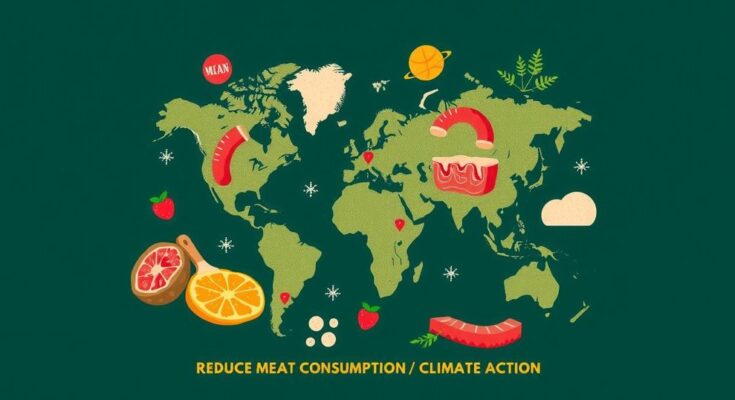The TAPP Coalition has urged for a global meat tax at the 2024 U.N. Climate Change Conference, advocating for changes in dietary guidelines and the promotion of vegetable subsidies to combat climate change. The coalition criticized certain countries for their slow adoption of food pricing policies while praising others for their progressive measures. The conference also addressed broader climate issues and diplomatic engagements, with significant implications for global food policy reforms.
At the recent 2024 U.N. Climate Change Conference (COP29), the TAPP Coalition advocated for the implementation of a global meat tax, highlighting its potential to mitigate climate change by reducing meat consumption and promoting vegetable subsidies. During the conference held in Baku, Azerbaijan, TAPP policy officer Willem Branten urged major global stakeholders, including the EU and China, to commit to dietary reforms as part of the final resolutions of the conference. The coalition criticized some nations, including the United States, for lagging in sustainable food pricing policies, while praising Switzerland and Denmark for their proactive measures. The discussion around taxing meat was brought into focus following a report from the U.N. Food and Agriculture Organization (FAO), evaluating the impact of food taxation on climate. TAPP asserts that harmonized pricing mechanisms in agriculture are essential for achieving significant reductions in greenhouse gas emissions associated with animal protein overconsumption. The coalition believes the forthcoming COP29 conclusions should reflect a collective effort towards these dietary transitions to align with both national and global dietary guidelines. This year’s conference not only addressed climate issues but also included diplomatic engagement with nations such as Afghanistan, marking its first attendance under Taliban rule since 2021. President Joe Biden did not personally attend the event, delegating senior officials to engage in discussions regarding energy and climate strategies. Despite the significant topics at hand, the TAPP Coalition expressed disappointment regarding the slow adoption of food pricing climate policies among several prominent countries.
The TAPP Coalition consists of organizations advocating for environmentally sustainable food policies. Their proposal at COP29 for a meat tax aligns with global efforts to combat climate change by addressing the high greenhouse gas emissions associated with livestock farming. Meat consumption is a substantial contributor to climate-related issues, and the coalition posits that implementing taxes on animal protein, coupled with subsidies for plant-based food, could alter dietary habits and promote healthier eating practices. This call for action coincides with broader discussions on food pricing policies among U.N. member states, emphasizing the need for concerted global efforts to shift towards sustainable dietary guidelines in response to climate challenges.
In conclusion, the TAPP Coalition’s push for a global meat tax at COP29 underscores the urgency of addressing climate change through dietary reforms and sustainable food pricing. By advocating for the taxation of meat and subsidies for vegetables, the coalition aims to initiate transformative changes in global food consumption patterns. The contrasting approaches of leading and lagging nations highlight the critical need for collective action at the international level to effectively tackle the environmental impacts associated with animal agriculture.
Original Source: www.shorenewsnetwork.com




